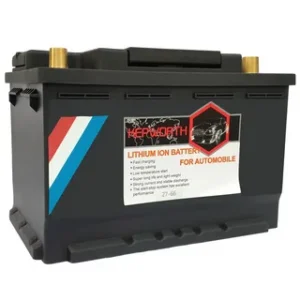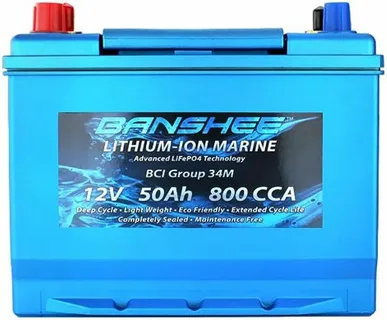The proper lithium starting battery is crucial for a smooth and reliable operation when powering your boat. With the increasing popularity of lithium-ion batteries, the market is flooded with a wide range of options, making it difficult to choose the right one for your boat. A poor-performing battery can lead to costly repairs, downtime, and even safety risks. On the other hand, a high-quality lithium starting battery for boat can provide a marine-grade performance, ensuring your boat’s engine starts seamlessly, even in the harshest marine environments.
Benefits of Lithium Starting Batteries over Traditional Lead-Acid
Lithium starting batteries offer several key benefits over traditional lead-acid batteries:
- Weight: Lithium batteries are significantly lighter than lead-acid batteries. This weight reduction can enhance boat performance by improving speed, handling, and fuel efficiency.
- Energy Density: Lithium batteries have a higher energy density, meaning they can store more energy in a smaller and lighter package compared to lead-acid batteries. This compact size is advantageous for boats where space is limited.
- Faster Charging: Lithium batteries charge more quickly than lead-acid batteries. This rapid charging capability allows boat owners to spend less time waiting for batteries to charge and more time enjoying their time on the water.
- Longer Cycle Life: Lithium batteries typically have longer cycles than lead-acid batteries. They can endure more charge-discharge cycles before needing replacement, reducing maintenance costs and downtime.
- Maintenance: Lithium batteries require minimal maintenance compared to lead-acid batteries, which often need regular topping up with distilled water and periodic equalization charges.
- Performance in Cold Weather: Lithium batteries perform better in cold weather conditions than lead-acid batteries, maintaining their capacity and reliability even in sub-zero temperatures.
Factors to Consider When Choosing a Lithium Boat Starting Battery
When selecting a lithium boat starting battery, several factors must be considered to ensure you get the right one for your vessel. The first key consideration is the boat’s size and type. A smaller, personal watercraft may require a smaller battery with a lower Ah rating. At the same time, a more extensive luxury yacht may need a more substantial battery with a higher Ah rating.
Another critical factor is the type of boat’s electrical system. Does it have a 12V, 24V, or 48V system? Choosing a lithium starting battery that matches the boat’s electrical system is vital to ensure proper compatibility and performance. The battery’s capacity to handle high discharge rates is also essential, as it will be necessary to provide a quick burst of power to start the engine.
The battery’s physical dimensions and weight are also important considerations. A larger battery may not fit in the limited space available on a smaller boat, or its weight may compromise the boat’s stability. Furthermore, the battery’s maintenance requirements, such as charging and monitoring, should also be considered.
Some lithium batteries are designed to be maintenance-free, while others may require regular checks to ensure optimal performance. Considering these factors, you can make an informed decision and select the proper lithium starting battery for your boat, providing a reliable and efficient starting experience.
 Understanding Lithium Battery for Starting Boat Motor
Understanding Lithium Battery for Starting Boat Motor
A Lithium battery for starting boat motor is tailored to deliver high burst currents quickly and efficiently, making it ideal for marine applications. Unlike traditional lead-acid batteries, lithium starting batteries provide instant power without weight and size constraints. Their superior energy density allows for compact, lightweight designs that save space onboard while enhancing overall boat performance.
Additionally, these batteries offer rapid recharge capabilities, which are advantageous for boaters needing quick turnarounds between uses. Their durability and longer cycle life ensure reliable operation over extended periods, even in harsh marine environments. Overall, lithium starting batteries represent a significant advancement in marine battery technology, offering boaters enhanced reliability, efficiency, and performance for starting boat motors.
These batteries are prized for delivering high-cranking amps (CCA) efficiently, ensuring reliable starts for boat engines, especially in cold conditions where traditional lead-acid batteries may struggle. Their lightweight and compact design makes them easy to install and manage on board, freeing up space and reducing overall weight, contributing to improved fuel efficiency and better boat handling. Lithium starting batteries also boast faster charging times and longer life spans than lead-acid alternatives, reducing maintenance needs and enhancing overall reliability during extended trips on the water.
Key Features to Look for in a Lithium Starting Battery
When selecting a lithium starting battery for your boat, it’s crucial to focus on the key features to ensure optimal performance and reliability. One of the most important considerations is the battery’s capacity, measured in ampere-hours (Ah). A higher capacity rating means the battery can provide more power to start your boat’s engine, even in extreme conditions.
Another critical feature to look for is the battery’s cold cranking amps (CCA), which measures the battery’s ability to start the engine in freezing temperatures. A higher CCA rating is essential for boaters who operate in colder climates or during the winter months.
Additionally, the battery’s discharge rate, measured in hours, is a vital factor to consider. A slower discharge rate ensures that the battery can provide a consistent power output over a more extended period, reducing the risk of the engine stalling or the battery dying prematurely.
The battery’s physical dimensions and weight are also important considerations, as they can impact the overall design and functionality of your boat’s electrical system. Look for a battery with a compact design that fits seamlessly into your boat’s available space, and consider a lighter-weight option to minimize the impact on your boat’s overall performance.
Finally, the battery’s warranty and expected lifespan are essential factors. A reputable manufacturer should offer a comprehensive warranty that covers defects and failures, and a reasonable lifespan of at least 5-7 years is expected for a high-quality lithium starting battery.
Lithium Battery for Starting Outboard Motor
A Lithium battery for starting outboard motors offers several advantages over traditional lead-acid batteries. These batteries are typically lighter and more compact, making them easier to install and manage on smaller boats with limited space. They provide higher cranking power (CCA), crucial for quickly starting outboard motors, especially in colder temperatures. This superior performance in cold weather ensures reliable boating operations in varying conditions.
Lithium batteries charge faster than lead-acid batteries, allowing boaters to spend less time waiting for batteries to recharge and more time on the water. They also have a longer lifespan and require less maintenance, reducing the hassle and cost associated with battery upkeep.
Lithium batteries for starting outboard motors are valued for their reliability, efficiency, and performance enhancements, making them a preferred choice among boat owners looking to optimize their boating experience with advanced battery technology.
Installation and Maintenance Considerations
After carefully selecting the perfect lithium starting battery for your boat, it’s essential to consider the installation and maintenance requirements to ensure optimal performance and longevity. Proper installation is critical to ensure the battery is safely and securely fixed and all electrical connections are made correctly. It will prevent any potential damage or electrical shocks and guarantee the battery’s ability to function as intended.
A lithium starting battery is relatively low-maintenance compared to traditional lead-acid batteries. However, regular checks and upkeep are still necessary to extend its lifespan and prevent potential issues. It includes monitoring the battery’s state of charge, ensuring the electrolyte level is within the recommended range, and cleaning the terminals and connectors to prevent corrosion.
Moreover, it’s crucial to familiarize yourself with the manufacturer’s specific installation, maintenance, and charging procedures guidelines. It will help you avoid any potential damage or void the warranty. By correctly installing and maintaining your lithium starting battery, you’ll enjoy the peace of mind of knowing your boat’s electrical system is reliable, efficient, and ready for the open waters.
The Future of Deep Cycle Battery Systems
The future of deep cycle battery systems is poised for significant advancements driven by evolving technology and increasing demand for sustainable energy solutions. Deep cycle batteries are crucial for applications requiring long-term energy storage and repeated deep discharges, such as renewable energy storage, electric vehicles, and off-grid power systems.
One key trend shaping the future of deep-cycle batteries is the development of advanced chemistries, including lithium-ion and beyond. Lithium-ion batteries dominate the market due to their higher energy density, longer cycle life, and faster charging capabilities than traditional lead-acid batteries. As research and development efforts progress, we expect further improvements in energy density, efficiency, and cost-effectiveness, making deep-cycle batteries more accessible and versatile for various applications.
Moreover, innovations in battery management systems (BMS) and smart grid technologies are enhancing the reliability and performance of deep-cycle battery systems. These technologies enable better monitoring, optimization of charging cycles, and integration with renewable energy sources, thereby maximizing efficiency and reducing environmental impact.
Future advancements in materials science, manufacturing processes, and recycling technologies will play pivotal roles in making deep-cycle batteries more sustainable and environmentally friendly. As the demand for clean energy solutions grows, deep-cycle battery systems will likely become more integral to the transition towards a greener, more resilient energy infrastructure worldwide.
Safety Precautions and Tips for Working with Lithium Batteries
Working with lithium batteries requires careful attention to safety due to their unique characteristics. Here are some essential precautions and tips:
- Handling: Always handle lithium batteries carefully to avoid physical damage, which can lead to leakage, fire, or explosion. Wear appropriate protective gear, such as gloves and safety glasses, when handling batteries.
- Charging: Use only chargers designed specifically for lithium batteries and follow the manufacturer’s charging instructions closely. Avoid overcharging or charging at high temperatures, as this can damage the battery and pose a safety risk.
- Storage: Store lithium batteries in a cool, dry place away from direct sunlight and heat sources. Ensure batteries are stored in a non-conductive container to prevent short circuits.
- Transportation: When transporting lithium batteries, ensure they are properly insulated and protected from physical damage. Avoid storing them loose in a vehicle where they can be subjected to excessive vibration or impact.
By following these safety precautions and tips, you can minimize risks associated with working with lithium batteries and ensure safe operation in both recreational and professional settings.
Conclusion
As you’ve reached the end of this comprehensive guide, you’re now equipped with the knowledge to make an informed decision about choosing the proper lithium starting battery for boat. You’ve learned the importance of understanding your boat’s starting system, the different types of lithium batteries available, and calculating your boat’s power needs. In conclusion, investing in a high-quality lithium starting battery is crucial for ensuring your boat’s reliable performance and longevity. Considering the factors in this guide, you can select the perfect battery to meet your boat’s unique needs.
FAQS
What Are The Advantages Of Starting Batteries With Lithium Over Lead-Acid Batteries For Boats?
Lithium batteries are lighter, have higher energy density, charge faster, and have longer lifespans than lead-acid batteries. They also require less maintenance and perform better in cold weather.
Will A Lithium Starting Battery Fit My Boat’s Existing Battery Compartment?
Lithium starting batteries are designed to be compact and lightweight, making them suitable for various boat configurations. However, it is always a good idea to check their dimensions and compatibility with your boat’s electrical system.
Are Lithium-Starting Batteries Safe For Marine Use?
When handled and maintained correctly, lithium batteries are safe for marine applications. To ensure safety, it is essential to follow manufacturer guidelines for charging, handling, and storage.
| Other Good Articles to Read |
| Gabrielle Blogs |
| Jason Toff Blogs |
| Thumb Blogs |
| Blog Shifter |
| Social Bookmarking Blogs |
| Blog Solidaire |
| Michael Coyne Blog |
| Born Free Blog |
| Oz Blog Hosting |
| Indepth News |
| Link Forum |
| Related Business Listings |
| Contact Directory |
| Local Business Profiles |
